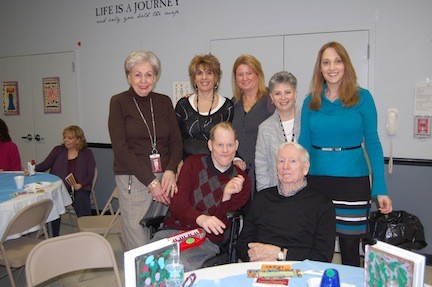Rockville Centre families make a dream come true
Thanks to the friendship of three caring women from Rockville Centre, a special room known as the Multi-Sensory Environment (MSE) was created for use by individuals with developmental disabilities at the United Cerebral Palsy Association of Nassau County, Inc. in Roosevelt. Debbie Hughes, her daughter Michelle McCormack and their neighbor and friend Wendy Marcari made it possible to secure the funding needed to establish this special room. In honor of Debbie’s son and Michelle’s brother, it was named “Scotty’s Place” at the official ribbon-cutting ceremony held in January.
At the ceremony, UCPN Assistant Executive Director Karen Geller-Hittleman expressed thanks to Debbie, Michelle and Wendy, saying the MSE, “is truly a dream come true,” as she lifted a heavy three-ring binder filled with reports about the value of the MSE and applications for funding that never came through due to major budget cuts. Geller-Hittleman went on to express gratitude on behalf of all at the agency and let everyone know what remarkable results were already occurring with participants who had the opportunity to experience visits to Scotty’s Place.
The UCPN has been assisting individuals with disabilities since 1948. Today, close to 2,000 children and adults benefit from the programs and services the non-profit organization provides. Scotty Hughes began school at UCPN at the age of 5 and continues to participate in the Adult Day Services program. His whole family is very supportive of the agency and his mom and sister serve on the UCPN Board of Directors.
Scotty’s Place is already changing the lives of many adults with disabilities at UCPN. Some individuals with disabilities have difficulty with sensations in the environment: sights, sounds, touch sensation and movement. The body and brain do not process sensory information appropriately and the environment then becomes overwhelming.
“The MSE room offers exposure to visual, auditory and touch sensations in a safe and stable environment, allowing the therapist to control the amount and type of exposure so that the individual can learn to process the information in the room with the long term goal being the ability to then process information and tolerate sensations in the environment,” said Sharon O’Brien, an occupational therapist at UCPN. “Once the individual is able to filter out sensory information, they can focus on the task at hand, whether it is making eye contact with a caregiver, eating a meal or just being able to sleep through the night.”
For more information on UCPN go to www.UCPN.org or call 516-378-2000 ext 355.

 55.0°,
Overcast
55.0°,
Overcast 




